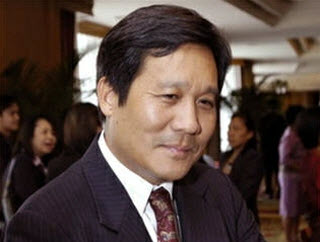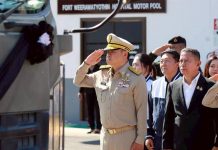BANGKOK, May 21 – The board of directors of Thailand’s national flag carrier Thai Airways International (THAI) on Monday terminated the employment contract of President Piyasvasti Amranand, a decision which stirred outrage among the company’s labour union members.
The THAI board resolved with 12 out of 13 members voting to end the employment contract of Mr Piyasvasti, effective next month and that he will be compensated with six months of his current salary, altogether estimated at Bt6 million.

Citing communication problems as the main reason to sack Mr Piyasvasti, board chairman Ampon Kittiampon explained that the panel made its decision although Mr Piyasvasti had passed his performance assessment with a high score.
“The communications problem between the board and the president could result in failure to achieve the company’s target of Bt7 billion profit as earlier announced to shareholders,” Mr Ampon said.
Board chairman Ampon reasserted that the contract termination is not politically motivated as seven of 12 board members who voted to end the employment contract were appointed by the previous government.
The board named Executive Vice President Strategy & Business Development Chokchai Panyayong acting president, replacing Mr Piyasvasti, and quickly established a committee to select a new president, headed by Ministry of Finance Permanent Secretary Areepong Poocha-um, within three months.
Monday’s board decision reportedly sparked dissatisfaction among the airline’s labour union members. When the decision was announced, union members quickly asked for the reasons of such a decision. Security was tightened during the board’s news conference.
Mr Piyasvasti, 59, began his term as Thai Airways International president in October 2009.
After graduating from England’s Oxford University, Mr Piyasvasti headed Thailand’s National Energy Policy Office in the 1990s and was minister of energy during 2006-2008.
Mr Piyasvati earlier announced the airline’s first quarter operating results with profit before income tax of Bt3,341 million and net profit of Bt3,645 million, after ending 2011 with a Bt10 billion loss.
He attributed operating profits to cost reductions, operations changes and rising passenger load as Thailand returned to normal after last year’s severe flooding.
Shortly after the announcement, THAI labour union president Jamsri Sukchotrat said the union did not accept the board’s decision, arguing that the outgoing president is a person of integrity with no tainted record and working for the company’s benefits with proven performance.
“Once again, political interference has become involved in THAI internal affairs,” she said.
Meanwhile, Mr Piyasvasti urged the board to clarify its decision, saying he wanted to know the ‘real’ reasons behind his replacement. If the decision happens to damage his reputation, he might consider filing a lawsuit against the board.
He commented that his replacement might have stemmed from various factors including political interference as well as internal graft probe.
The outgoing president said he has dedicated his work with outstanding performance by turning around the company’s economic performance from an accumulated loss of Bt20 billion to a position of profitability.
He warned that THAI could experience troubles as in the past if the board fails to keep its hands off management.




